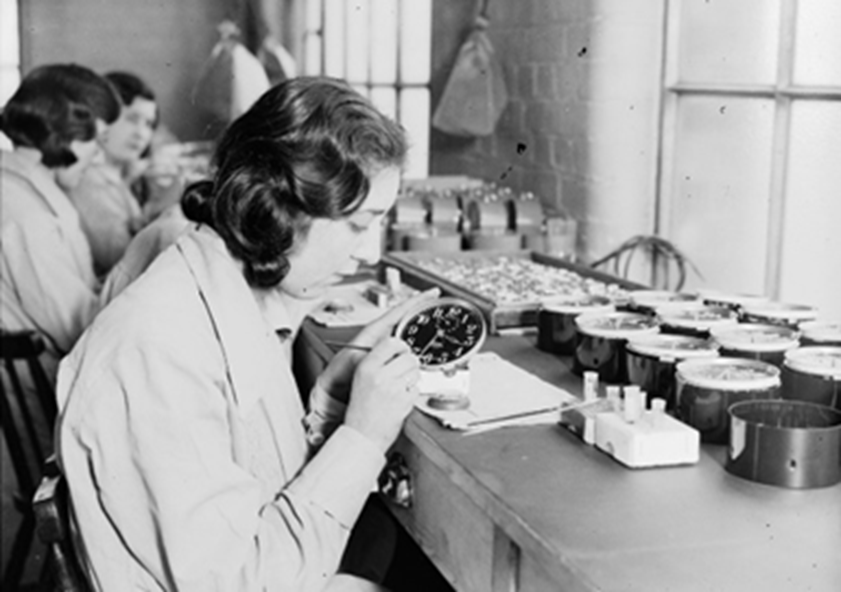
To listen to today’s reflection as a podcast, click here
At the beginning of the 20th century, radium – element No. 88 on the periodic table – was one of the happiest stories in America.
The husband-wife scientific team of Pierre and Marie Curie had identified the mysterious radioactive substance in 1898 in their Paris laboratory.
It didn’t take long to discover that radium had fascinating properties. When combined with other substances, it glowed bright green – a dazzling color that elicited ooh’s and ah’s. It also had the power to destroy human cellular tissue. Cancer cells, for instance.
Radium immediately vaulted to the top of the world’s list of cure-all’s. It was called the Greatest Find of History. It was touted as the cure for hay fever, constipation, gout – you name it.
Preachers declared that radium was the fulfillment of Bible prophecy: “The sun of righteousness shall rise with healing in its wings” (Malachi 4:2). Most Bible scholars had been content to believe that that verse concerned Jesus. But radium had become big stuff.
People swallowed radium pills. They drank radium-laced water. They ate radium butter, applied radium-tainted cosmetics, and even wore radium underwear.
Elderly men claimed that radium restored their vitality and made them feel younger. Some even said they could feel themselves sparkling from the inside out.
Among those who counted themselves most fortunate during the early radium craze were thousands of factory dial painters. These young women received good wages for painting the glow-in-the-dark dials on clocks and timepieces, both for the U.S. military during World War I and retail products available in the 1920s.
They were trained to point their radium-laced brushes by putting them into their mouths. Dip, point, paint – hundreds of times every day.
Their managers assured them they were never in any danger. If anything, they were blessed to receive the health-giving benefits of radium. Some of the girls dabbed the radium paint on their teeth – something guaranteed to be noticed on their next big date.
Bits of radium settled everywhere – on their shoulders, their hair, their clothes, their shoes. To this day, Marie Curie’s cookbooks remain radioactive because of the radium she brought home from the lab.
At first, no one grasped the incredible danger of long-term exposure to radioactive radium. But it didn’t take long for the happiest story in America to become one of the saddest.
As Kate Moore documents in her book The Radium Girls: The Dark Story of America’s Shining Women, element No.88 turned out not to be a cure-all, but a diabolical poison.
Yes, radium could eradicate cancer cells. But it was utterly indiscriminate in its lethal power. It also caused cancer. Radium settled into the bones of the dial-painting girls, many of whom died within a few years in agonizing pain.
The corporations that profited from radium-based products were quick to deny any connection between The Greatest Find of History and life-threatening illnesses.
It was only through the perseverance and courageous testimony of the women, some of whom had mere months to live, that finally delivered justice in the late 1930s. Their voices helped establish safety precautions in working with nuclear materials, and also helped bring about the 1970 establishment of OSHA.
Radium remains a chilling object lesson.
There are myriad things that can destroy our lives, slowly and imperceptibly, even while some people applaud their power to bless.
It’s worth noting that the validity of only one of the Ten Commandments – “Do not commit murder” – is widely affirmed in America today.
The freedom to break the other commandments – to bend the truth, to grab what we can for ourselves, to keep our distance from annoying parents, to sleep with whomever we want, to long for things we don’t have, to insult God’s name, to turn our careers and bank accounts into idols, and to make up our own Ultimate Meaning – is considered part and parcel of what we call “normality” in our culture.
It’s telling that when celebrities walk across these moral minefields, we shrug. Oh, those celebrities. What’s genuinely alarming is that surveys consistently show that self-proclaimed American Christians do essentially the same things at almost the same rate.
But personal autonomy is our social entitlement, right?
Yet if the Author of those commandments is really there, it doesn’t matter what we think we’re entitled to in the name of freedom. We can’t do an end run around the spiritual toxicity of disobeying God.
The good news is that we can still choose to go a different way.
God has the power at any given moment to turn the saddest stories in our lives into happy ones.
